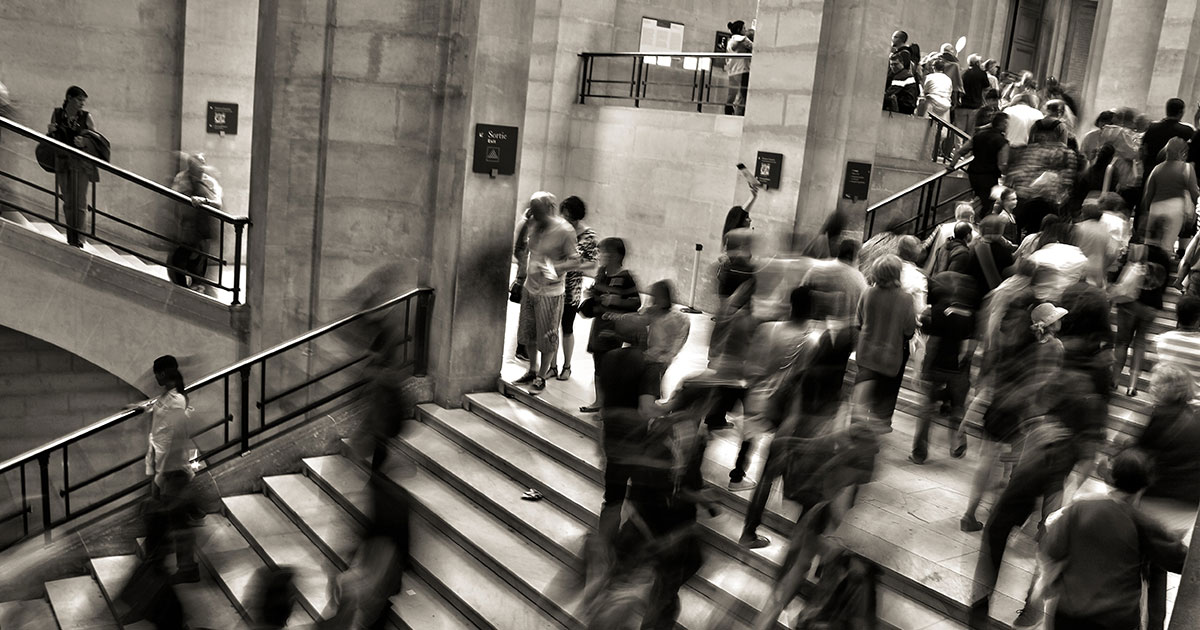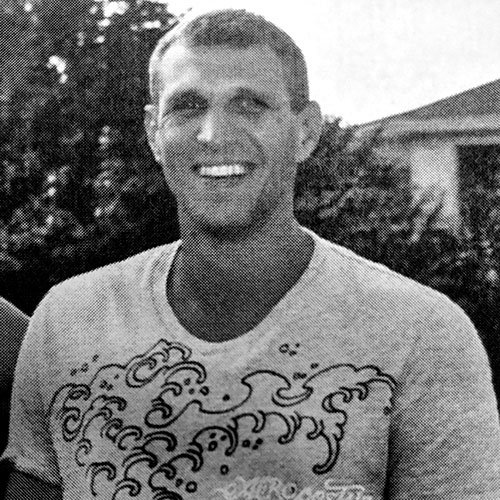FROM THE INSIDE
★ ★ ★ ★
ALONE IN A CROWD

Image by Jose Martin Ramirez-Carrasco
By Ryan M. Moser
I moved in certain social circles before I was arrested for burglary. I ate at swanky gastro pubs, attended sales meetings, rode on trains, and walked through museums… all the things that everyday people do. Yet during all those many years, surrounded by billions of human beings on planet Earth, I still couldn’t shake the frequent feeling that I was alone in a crowd. It wasn’t an all-encompassing, misanthropic sentiment that followed me everywhere I went; on the contrary, I’m a people person. I wasn’t always a loner like I am now, keeping to myself on the rec yard and only talking to my few acquaintances. I was a gregarious soul with many friends and a large, loving family; a talker who easily engaged strangers in conversation. It’s just that there’s always been a slight separation between me and you and you and him and him and her and on and on. A narrow space of preventative caution or unwavering opinions that created a gulf—both unknowingly and intentionally. An aura rift, if you will.
This pandemic has changed the way people perceive their place in the world, just as the Department of Corrections has altered the way I interact within a social community. Being in prison has been the loneliest experience of my life—nothing can prepare you for the isolation of being a state-owned pariah living inside of a cinderblock box. Every imaginable separation exists for the incarcerated: race, class, status, gang affiliation, education, criminal charges, cellblocks, officer and inmate. These spaces between us create animosity that resonates throughout the penal system, causing violent conflicts that result in further separation.
The ironic thing about living in prison is that I have less personal space than ever before and live in close quarters, but there’s still a vast chasm of differences between me and the other men. The physical distance between inmates pulls in like a vacuum until we’re standing shoulder to shoulder, but I have never been so alone.
During this time in my life, I’m not in a relationship with a woman or going to barbeques with friends. I’m distanced from my family in Philly by 800 miles, sitting on a broken phone in Miami, Florida while struggling to hear their words of encouragement. Surrounded by multitudes of men who don’t care if I live or die; who don’t ask me how my day was or offer a helping hand. I lie down at night alone with my mind racing, worrying about the future with no one to share my trepidation with. No long blond hair spilling over the pillow as we cuddle and talk about our hopes and dreams. There’s no way for me to take my son to the park or join a writer’s workshop on Facebook.
Some days I yearn for human interaction so badly that I put NPR on my headphones. and imagine that I’m having a conversation with the commentator. Everyone in the free world is far away from me spatially and metaphorically, and I talk to myself more and more; an inner dialogue pervades my every waking moment, judging and planning, complaining and praying. I watch sitcoms and daydream about life outside… even ordinary errands and work seem interesting now.
I’m surrounded by so many inmates throughout my day that it looks like a small city inside a concrete maze. I walk to the req yard with 500 or 600 ornery inmates. The administration packs forty of us into the medical. waiting room. I sleep three feet above my bunkmate. I eat meals two feet away from the other men. I stand in line only twelve inches behind the next prisoner, yet I am miles away from anyone.
Living alone in a crowd is like dying of thirst in an ocean of saltwater—relief is so close but impossible to ever reach. Maybe if I was an introvert it would be easier, but as a social creature craving contact, it’s devastating. I no longer manage a softball team or go to brunch with my family, chatting to a waiter about the weather or holding the door for a talkative grandmother. During the COVID-era, many of the world’s citizens can relate to that feeling of loneliness—for a man or woman sentenced to prison, that feeling consumes every second, causing depression, institutionalization, and fear of the unknown.
The isolation of incarceration is real and unique: where else can you be forced into seclusion with people, but where divisions remain because of skin color or background? The criminal justice system cuts us off from society while simultaneously dividing us amongst our peers, expecting us to get along while knowing it will never happen.
This disjointing prison environment is a mirror of the outside where politics, faith, and sex divide. There are so many combating issues intersecting humans that it’s interesting how fiercely it hurts to be separated against our will by this novel coronavirus. It’s almost like we never really enjoyed being around other people, but now that we can’t, everyone is outraged and sad.
If socializing within our species really does amplify our overall happiness and promote evolution, then why the hell are we so mean to one and other all the time? Where does this lack of compassion come from?
While the world is on pause, it’s a good time to take inventory of ourselves as a collective whole, and ask what things like freedom, empathy, family, and purpose really mean to us; I can do the same from inside these walls. We should ask how we can respect each other more. We can ask what is really important in life. If the coronavirus has taught us anything, it’s that we were all living a little superficially in the before times, and not always doing what’s right.
Change is one good thing that can come from this pandemic, and also while I’m incarcerated. When speaking about the COVID lockdown, poet Tiana Clark says “it gets lonely living by myself in such an isolating time, but the solitude is shaping something beautiful in me that I can’t name just yet.” Maybe I am morphing into something greater too… only time will tell.

Ryan M. Moser is a recovering addict serving a ten-year sentence in the Florida Department of Corrections for a nonviolent property crime. Previous publications include Evening Street Press, Storyteller, Santa Fe Literary Review, The Progressive, themarshallproject.org, medium.com, thewildword.com, thestartup.com, and more. In 2020, his essay “Injuries Incompatible with Life” received an Honorable Mention award from PEN America, including publication on pen.org. Ryan is a Philadelphia native who enjoys yoga, playing chess, and performing live music. He is a proud father of two beautiful sons.
This column was made possible with the help of Exchange for Change, a non-profit based in Florida that teaches writing in prisons and runs letter exchanges between incarcerated students and writers studying on the outside.
Exchange for Change believes in the value of every voice, and gives their students an opportunity to express themselves without the fear of being stigmatized. Their work is based on the belief that when everyone has the ability to listen and be heard, strong and safe communities are formed, and that with a pen and paper, students can become agents of change across different communities in ways they may otherwise have never encountered.
























Mr Moser is a talented writer
I just read your most recent piece in Truthout and see the talent and authenticity of your words.
I have a nephew who has spent five stints in prison (currently out) due to drug addiction and the collateral ills connected to it – as you well know.
This is just to say, I hold you in my heart, as I do my nephew.
Your life is important even while incarcerated. I am mindful that every moment is the only time we have – do your best to do your best.
Do try to keep heart, one day you will be home again and can do much to make the world the better place you dream of and hope for, live for.
~ that peace and every good thing is yours ~